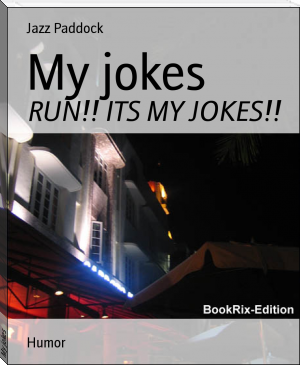A Book of Burlesques, H. L. Mencken [best e book reader .txt] 📗

- Author: H. L. Mencken
Book online «A Book of Burlesques, H. L. Mencken [best e book reader .txt] 📗». Author H. L. Mencken
Go it, professor! That’s the best you’ve done yet!
[98]
One of the Critics
Too fast!
Another Critic
Too slow!
A Young Girl
My, but ain’t the professor just full of talent!
The Great Pianist
Well, so far no accident. (He negotiates a difficult passage, and plays it triumphantly, but at some expenditure of cold perspiration.) What a way for a man to make a living!
The Virgin
What passion he puts into it! His soul is in his finger-tips.
A Critic
A human pianola!
The Great Pianist
This scherzo always fetches the women. I can hear them draw long breaths. That plump girl is getting pale. Well, why shouldn’t she? [99]I suppose I’m about the best pianist she has ever heard—or ever will hear. What people can see in that Hambourg fellow I never could imagine. In Chopin, Schumann, Grieg, you might fairly say he’s pretty good. But it takes an artist to play Beethoven. (He rattles on to the end of the scherzo and there is more applause. Then he dashes into the finale.)
The Dean of the Critics
Too loud! Too loud! It sounds like an ash-cart going down an alley. But what can you expect? Piano-playing is a lost art. Paderewski ruined it.
The Great Pianist
I ought to clear 200,000 marks by this tournee. If it weren’t for those thieving agents and hotelkeepers, I’d make 300,000. Just think of it—twenty-four marks a day for a room! That’s the way these Americans treat a visiting artist! The country is worse than Bulgaria. I was treated better at Bucharest. Well, it won’t last forever. As soon as I get enough of their money they’ll see me no more. Vienna is the place to settle down. A nice studio at fifty marks a month—and the life of [100]a gentleman. What was the name of that little red-cheeked girl at the café in the Franzjosefstrasse—that girl with the gold tooth and the silk stockings? I’ll have to look her up.
The Virgin
What an artist! What a master! What a——
The Married Woman
Has he really suffered, or is it just intuition?
The Great Pianist
No, marriage is a waste of money. Let the other fellow marry her. (He approaches the closing measures of the finale.) And now for a breathing spell and a swallow of beer. American beer! Bah! But it’s better than nothing. The Americans drink water. Cattle! Animals! Ach, München, wie bist du so schön!
(As he concludes there is a whirlwind of applause and he is forced to bow again and again. Finally, he is permitted to retire, and the audience prepares to spend the short intermission in whispering, grunting, wriggling, scraping its feet, rustling its programs and gaping at hats. [101]The Six Musical Critics and Six Other Men, their lips parched and their eyes staring, gallop for the door. As The Great Pianist comes from the stage, The Janitor meets him with a large seidel of beer. He seizes it eagerly and downs it at a gulp.)
The Janitor
My, but them professors can put the stuff away!
[103]
VI.—SEEING THE WORLDVI.—Seeing The World
[105]The scene is the brow of the Hungerberg at Innsbruck. It is the half hour before sunset, and the whole lovely valley of the Inn—still wie die Nacht, tief wie das Meer—begins to glow with mauves and apple greens, apricots and silvery blues. Along the peaks of the great snowy mountains which shut it in, as if from the folly and misery of the world, there are touches of piercing primary colours—red, yellow, violet. Far below, hugging the winding river, lies little Innsbruck, with its checkerboard parks and Christmas garden villas. A battalion of Austrian soldiers, drilling in the Exerzierplatz, appears as an army of grey ants, now barely visible. Somewhere to the left, beyond the broad flank of the Hungerberg, the night train for Venice labours toward the town.
It is a superbly beautiful scene, perhaps the most beautiful in all Europe. It has colour, dignity, repose. The Alps here come down a bit and so increase their spell. They are not [106]the harsh precipices of Switzerland, nor the too charming stage mountains of the Trentino, but rotting billows of clouds and snow, the high flung waves of some titanic but stricken ocean. Now and then comes a faint clank of metal from the funicular railway, but the tracks themselves are hidden among the trees of the lower slopes. The tinkle of an angelus bell (or maybe it is only a sheep bell) is heard from afar. A great bird, an eagle or a falcon, sweeps across the crystal spaces.
Here where we are is a shelf on the mountainside, and the hand of man has converted it into a terrace. To the rear, clinging to the mountain, is an Alpine gasthaus—a bit overdone, perhaps, with its red-framed windows and elaborate fretwork, but still genuinely of the Alps. Along the front of the terrace, protecting sightseers from the sheer drop of a thousand feet, is a stout wooden rail.
A man in an American sack suit, with a bowler hat on his head, lounges against this rail. His elbows rest upon it, his legs are crossed in the fashion of a figure four, and his face is buried in the red book of Herr Baedeker. It is the volume on Southern Germany, and he is reading the list of Munich hotels. Now and then he stops to mark one with [107]a pencil, which he wets at his lips each time. While he is thus engaged, another man comes ambling along the terrace, apparently from the direction of the funicular railway station. He, too, carries a red book. It is Baedeker on Austria-Hungary. After gaping around him a bit, this second man approaches the rail near the other and leans his elbows upon it. Presently he takes a package of chewing gum from his coat pocket, selects two pieces, puts them into his mouth and begins to chew. Then he spits idly into space, idly but homerically, a truly stupendous expectoration, a staggering discharge from the Alps to the first shelf of the Lombard plain! The first man, startled by the report, glances up. Their eyes meet and there is a vague glimmer of recognition.
The First Man
American?
The Second Man
Yes; St. Louis.
The First Man
Been over long?
[108]
The Second Man
A couple of months.
The First Man
What ship’d you come over in?
The Second Man
The Kronprinz Friedrich.
The First Man
Aha, the German line! I guess you found the grub all right.
The Second Man
Oh, in the main. I have eaten better, but then again, I have eaten worse.
The First Man
Well, they charge you enough for it, whether you get it or not. A man could live at the Plaza cheaper.
The Second Man
I should say he could. What boat did you come over in?
[109]
The First Man
The Maurentic.
The Second Man
How is she?
The First Man
Oh, so-so.
The Second Man
I hear the meals on those English ships are nothing to what they used to be.
The First Man
That’s what everybody tells me. But, as for me, I can’t say I found them so bad. I had to send back the potatoes twice and the breakfast bacon once, but they had very good lima beans.
The Second Man
Isn’t that English bacon awful stuff to get down?
The First Man
It certainly is: all meat and gristle. I wonder what an Englishman would say if you put [110]him next to a plate of genuine, crisp, American bacon.
The Second Man
I guess he would yell for the police—or choke to death.
The First Man
Did you like the German cooking on the Kronprinz?
The Second Man
Well, I did and I didn’t. The chicken à la Maryland was very good, but they had it only once. I could eat it every day.
The First Man
Why didn’t you order it?
The Second Man
It wasn’t on the bill.
The First Man
Oh, bill be damned! You might have ordered it anyhow. Make a fuss and you’ll get what you want. These foreigners have to be bossed around. They’re used to it.
[111]
The Second Man
I guess you’re right. There was a fellow near me who set up a holler about his room the minute he saw it—said it was dark and musty and not fit to pen a hog in—and they gave him one twice as large, and the chief steward bowed and scraped to him, and the room stewards danced around him as if he was a duke. And yet I heard later that he was nothing but a Bismarck herring importer from Hoboken.
The First Man
Yes, that’s the way to get what you want. Did you have any nobility on board?
The Second Man
Yes, there was a Hungarian baron in the automobile business, and two English sirs. The baron was quite a decent fellow: I had a talk with him in the smoking room one night. He didn’t put on any airs at all. You would have thought he was an ordinary man. But the sirs kept to themselves. All they did the whole voyage was to write letters, wear their dress suits and curse the stewards.
[112]
The First Man
They tell me over here that the best eating is on the French lines.
The Second Man
Yes, so I hear. But some say, too, that the Scandinavian lines are best, and then again I have heard people boosting the Italian lines.
The First Man
I guess each one has its points. They say that you get wine free with meals on the French boats.
The Second Man
But I hear it’s fourth-rate wine.
The First Man
Well, you don’t have to drink it.
The Second Man
That’s so. But, as for me, I can’t stand a Frenchman. I’d rather do without the wine and travel with the Dutch. Paris is dead compared with Berlin.
[113]
The First Man
So it is. But those Germans are awful sharks. The way they charge in Berlin is enough to make you sick.
The Second Man
Don’t tell me. I have been there. No longer ago than last Tuesday—or was it last Monday?—I went into one of those big restaurants on the Unter den Linden and ordered a small steak, French fried potatoes, a piece of pie and a cup of coffee—and what do you think those thieves charged me for it? Three marks fifty. That’s eighty-seven and a half cents. Why, a man could have got the same meal at home for a dollar. These Germans are running wild. American money has gone to their heads. They think every American they get hold of is a millionaire.
The First Man
The French are worse. I went into a hotel in Paris and paid ten francs a day for a room for myself and wife, and when we left they charged me one franc forty a day extra for sweeping it out and making the bed!
[114]
The Second Man
That’s nothing. Here in Innsbruck they charge you half a krone a day taxes.
The First Man
What! You don’t say!
The Second Man
Sure thing. And if you don’t eat breakfast in the hotel they charge you a krone for it anyhow.
The First Man
Well, well, what next? But, after all, you can’t blame them. We Americans come over here and hand them our pocket-books, and we ought to be glad if we get anything back at all. The way a man has to tip is something fearful.
The Second Man
Isn’t it, though! I stayed in Dresden a week, and when I left there were six grafters lined up with their claws out. First came the porteer. Then came——
[115]
The First Man
How much did you give the porteer?
The Second Man
Five marks.
The First Man
You gave him too much. You ought to have given him about three marks, or, say, two marks fifty. How much was your hotel bill?





Comments (0)